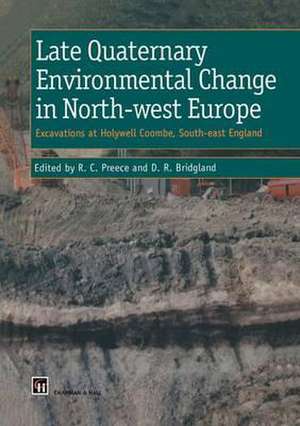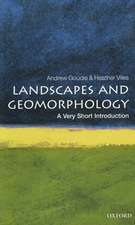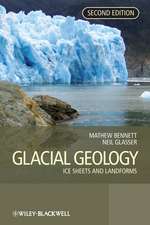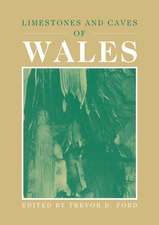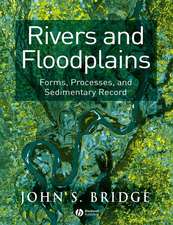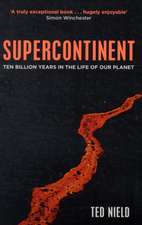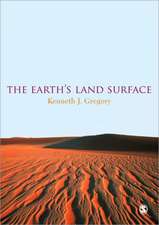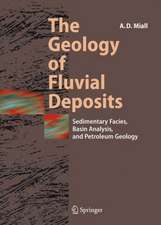Late Quaternary Environmental Change in North-west Europe: Excavations at Holywell Coombe, South-east England: Excavations at Holywell Coombe, South-east England
Editat de R. Preece, D.R. Bridglanden Limba Engleză Hardback – 31 aug 1998
The construction of the Channel Tunnel across the Holywell Coombe SSSI brought about a major rescue excavation, funded by Eurotunnel, that set an important precedent in Earth Science conservation. This multidisciplinary investigation has added enormously to our understanding of the environment and natural history of the Late-glacial and Holocene. The climatic complexity of the Late-glacial is recorded in the nature of the sediments, the fossils recovered from them and the soils developed within them.
From the Neolithic, and especially during the Early Bronze Age, the slopes were destabilized as a result of forest clearance, leading to the accumulation of hillwash. Archaeological excavations in the hillwash have revealed evidence of prehistoric occupation and agricultural activity in the coombe.
Eurotunnel also funded biological surveys of the local terrestrial and aquatic habitats. Combining these with the fossil evidence, it has been possible to document the pedigree of our present fauna and flora, providing one of the most detailed and comprehensive studies of its kind. With contributions from eminent Quaternary scientists from several countries, this work will be an important resource for researchers, lecturers and postgraduate students in Quaternary sciences - geology, geography, biology, ecology and archaeology - as well as for government bodies concerned with nature conservation and environmental protection.
| Toate formatele și edițiile | Preț | Express |
|---|---|---|
| Paperback (1) | 967.71 lei 6-8 săpt. | |
| SPRINGER NETHERLANDS – 4 oct 2012 | 967.71 lei 6-8 săpt. | |
| Hardback (1) | 845.38 lei 39-44 zile | |
| SPRINGER NETHERLANDS – 31 aug 1998 | 845.38 lei 39-44 zile |
Preț: 845.38 lei
Preț vechi: 1112.34 lei
-24% Nou
Puncte Express: 1268
Preț estimativ în valută:
161.76€ • 169.80$ • 134.27£
161.76€ • 169.80$ • 134.27£
Carte tipărită la comandă
Livrare economică 07-12 aprilie
Preluare comenzi: 021 569.72.76
Specificații
ISBN-13: 9780412832307
ISBN-10: 0412832305
Pagini: 425
Ilustrații: XXI, 425 p.
Dimensiuni: 210 x 297 x 30 mm
Ediția:1998
Editura: SPRINGER NETHERLANDS
Colecția Springer
Locul publicării:Dordrecht, Netherlands
ISBN-10: 0412832305
Pagini: 425
Ilustrații: XXI, 425 p.
Dimensiuni: 210 x 297 x 30 mm
Ediția:1998
Editura: SPRINGER NETHERLANDS
Colecția Springer
Locul publicării:Dordrecht, Netherlands
Public țintă
ResearchCuprins
One. Introduction.- One. Introduction.- (1) Previous work.- (2) Scientific importance of the Holywell Coombe site.- (3) Nature of the threat.- (4) Programme of research.- (5) The nature of the investigation.- (6) Nomenclature and terminology.- (7) Storage and archive.- Two. Environmental Background.- Two. Environmental Background.- (1) Location of the site.- (2) Palaeogeographical context.- (3) Solid geology.- (4) Geomorphology.- (5) Climate.- Three. The Geology.- 1. Stratigraphical investigations.- (1) General stratigraphy inferred from the borehole survey.- (2) Representative sections.- (3) Correlation of sections.- 2. Sedimentological investigations.- (1) Petrography of sediments and buried soils.- (2) Petrology of tufa sediments.- (3) Mineral magnetic properties of valley-fill sediments: implications for provenance and weathering history.- Four. Radiocarbon Dating.- Four. Radiocarbon Dating.- (1) Introduction.- (2) Physical and chemical pretreatment.- (3) Sample preparation and isotopic measurement.- (4) Results and discussion.- Five. Biostratigraphy and Palaeoecology.- 1. Paleobotany.- (1) Introduction.- (2) Methods and results.- (3) Vegetational history.- (4) Notable plant records.- (5) Discussion.- 2. Fungal spores and other microfossils.- (1) Introduction: Quaternary palaeomycology.- (2) Methods: preparation and enumeration.- (3) Results.- (4) Fungi, algae and other non-pollen microfossils.- (5) Sample interpretations.- (6) Conclusions.- 3. Mollusca.- (1) Introduction.- (2) Sampling and laboratory analysis.- (3) Preservation.- (4) Notes on identification.- (5) Analysis of faunal change through the sections.- (6) Notes on selected species.- (7) Reversed coiling.- (8) Traces of predation.- (9) Synthesis of faunal history and molluscan zonation.- (10) Discussion and conclusions.- 4. Insects.- (1) Introduction.- (2) Sampling and analysis.- (3) Local environmental reconstructions based on the Coleoptera.- (4) Analysis of faunal changes.- (5) Summary of the local environment inferred from the Coleoptera.- (6) Climatic implications of the Coleoptera.- (7) Caddisflies and other aquatic insects N. E. Williams.- (8) Chironomidae.- 5. Mites.- (1) Introduction.- (2) Material and methods.- (3) Results.- (4) Discussion.- (5) Conclusions.- 6. Ostracoda.- (1) Introduction.- (2) Sampling and treatment of data.- (3) Taxonomy and problems of identification.- (4) Faunal analyses of the profiles.- (5) Comments on species of interest.- (6) Discussion and conclusions.- 7. Vertebrates.- (1) Introduction.- (2) Identification and interpretation.- Six. The Prehistory of Holywell Coombe.- Six. The Prehistory of Holywell Coombe.- (1) Introduction.- (2) The 1987 excavation.- (3) The 1988 excavation.- (4) The flint-work.- (5) The Neolithic-Early Bronze Age pottery.- (6) The Late Bronze Age and Iron Age pottery.- (7) The ‘Belgic’, Roman and later pottery.- (8) Conclusions.- (9) Holywell Coombe and other Channel Tunnel sites: a brief overview.- Seven. Present-day Ecology of the Folkestone Escarpment.- Seven. Present-day Ecology of the Folkestone Escarpment.- (1) Introduction.- (2) Modern surface soils.- (3) Vegetation.- (4) Invertebrate fauna.- (5) Discussion and conclusions.- Eight. Synthesis.- Eight. Synthesis.- (1) Geological sequence at Holywell Coombe.- (2) General conclusions and comparisons with sites elsewhere.- References.
